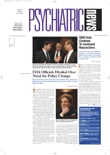The article in the February 4 issue on the Hamilton Depression Rating Scale (“Is End Near for Popular Assessment Tool?) prompts us to suggest that our standard mental status examination (MSE) be scrutinized as well and possibly replaced.
The MSE, often characterized as psychiatry's equivalent of the physical exam, is in fact a mixture of historical information, observations, and conclusions. “Thought process” is known from examination, but what we describe as “thought content” is history—phobias, compulsive behavior, and suicide ideation, for example. Hallucinations occurring at the time of the examination are “current mental state”; yesterday's hallucinations are history. “Judgment” is an evaluation.
The MSE is flawed because of a lack of agreement about the meaning of some of the terms. “Mood” and “affect” are often confounded. “Orientation to person” refers to the patient's awareness of his or her own identity, but some take it to mean recognition of the examiner, while “orientation to situation” is not a standard question. “Judgment” may reflect the patient's answers to test questions, or it may reflect recent conduct, such as fighting with a police officer or giving money to a con man. Some describe a patient as having impaired judgment if he or she has a drug habit or stops taking prescribed medication.
Ritualistically, we ask questions intended to evaluate “abstract thinking”—proverbs and similes—although subtle defects in abstract thinking no longer have the diagnostic significance they did when schizophrenia was a more frequently used diagnosis. Multidimensional concepts, such as “insight,” are handled simplistically.
Regulatory agencies and insurance payers routinely specify that the record must show a “complete” mental status examination. The clinician's response is a list of topics, each followed by a “zero” or“ plus,” providing a pseudo-complete report that fails to reveal what questions were asked or what answers given.
Modern psychiatry should employ instruments that are accurate and useful. Education of residents should encourage critical thought. We suggest that APA establish a committee to study the MSE, evaluate the validity and usefulness of its components, and make recommendations for a new standard, with plans for regular updates, perhaps in sync with revisions of the DSM.
